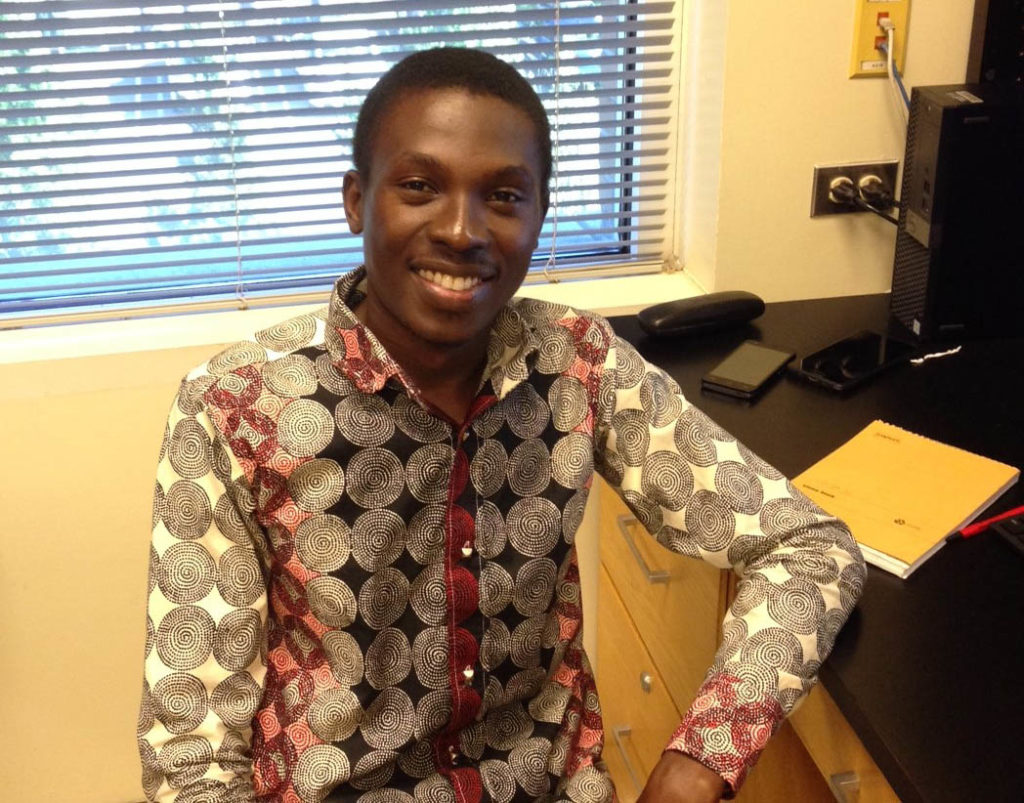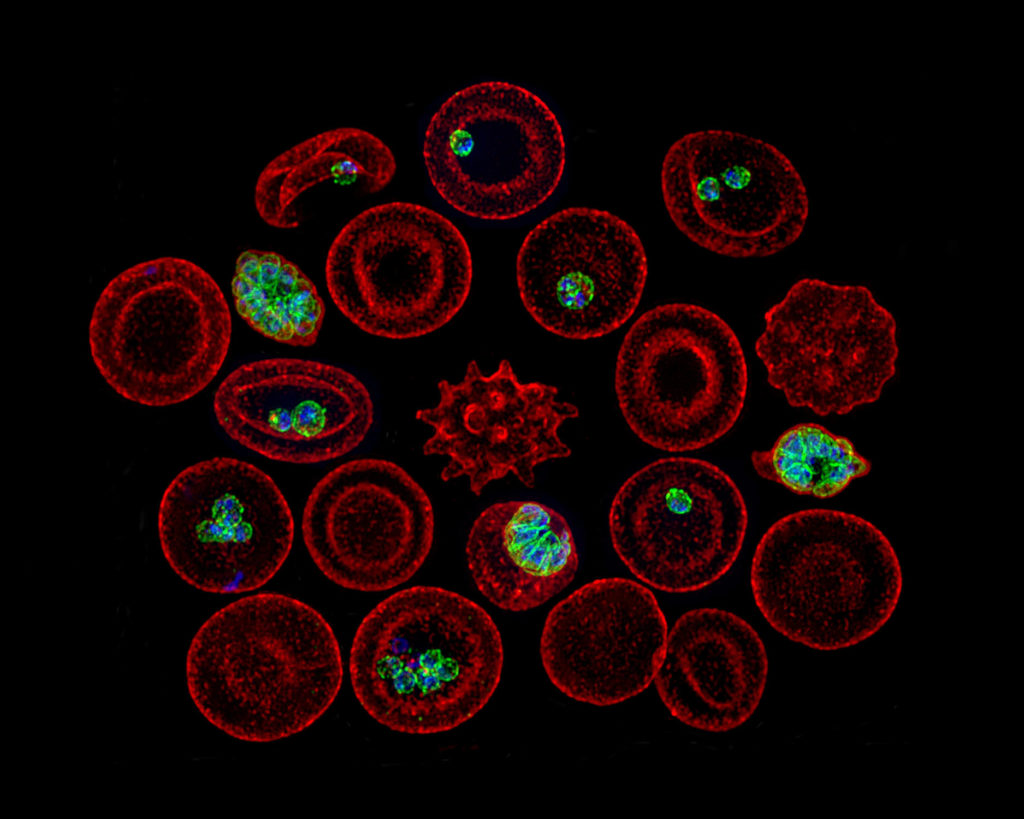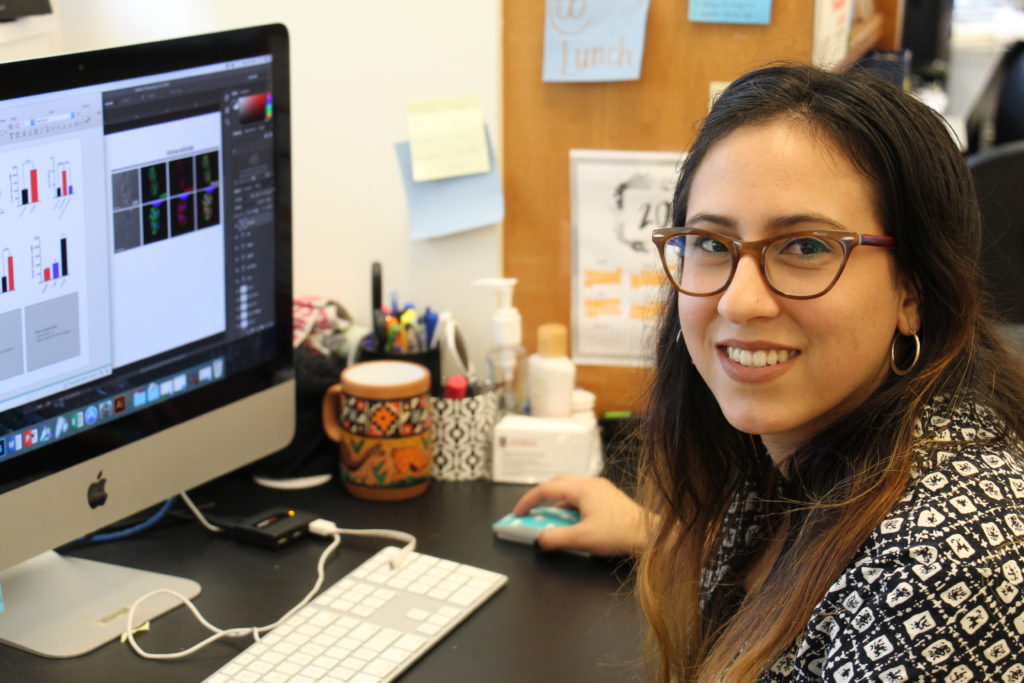Visiting Scholar: Elvis Ofori Ameyaw

Elvis Ofori Ameyaw is a Fulbright Scholar visiting M. Belen Cassera‘s laboratory in the department of molecular biology and biochemistry. He is a senior lecturer, Head of the Department of Biomedical Sciences and the Vice-Dean of the School of Allied Health Sciences in the College of Health and Allied Sciences at the University of Cape Coast in Ghana.
Dr. Ameyaw holds a B. Pharm and Ph.D. in Pharmacology. His research focuses on natural product drug discovery for infectious, in particular, malaria and Leishmania, and inflammatory diseases. At the University of Georgia, he is using in vitro techniques to screen some natural products isolates from plants that are traditionally used to treat malaria in Ghana.
“UGA is globally known for excellent research and education and my host scientist, Prof. M. Belen Cassera has created an envious and reputable niche in natural product research,” said Dr. Ameyaw.
The availability of seminars and other opportunities to interact with leading scientists also factored into Dr. Ameyaw’s decision to come to UGA.
“The research staff at UGA are very supportive and willing to share ideas.” said Dr. Ameyaw.
Athens reminds him of the college town of Cape Coast where he resides and works in Ghana.
“The city makes me feel at home away from home.”
Read more about Dr. Cassera’s natural products research.
UGA Researcher Seeks to Unlock Secrets of Malaria Parasite

Vasant Muralidharan and his research team at the University of Georgia’s Center for Tropical and Emerging Global Diseases are making great strides in understanding how the malaria parasite hijacks red blood cells to cause disease but many of the parasite’s strategies remain elusive. A new $1.875 million grant from the National Institutes of Health will allow them to continue this research.
Malaria is a parasitic disease that infects nearly 220 million people and kills nearly half a million people every year. Almost all the deaths occur in young children and primarily in sub-Saharan Africa. The parasite Plasmodium falciparum invades human red blood cells which directly leads to malaria symptoms that include headaches, muscle pain, periodic fevers with shivering, severe anemia, trouble breathing, and kidney failure. The parasite can also cause the most severe forms of malaria, such as cerebral malaria which can lead to brain damage, coma and death, and placental malaria, which occurs in pregnancy and can be life-threatening to both the mother and fetus.
Complete control of the infected red blood cell is required for parasites to grow and spread. The malaria parasite remodels the host cell by exporting hundreds of parasite proteins across numerous membranes that transform all aspects of infected red blood cells to suit its needs. The export of these proteins by P. falciparum to the host red blood cells is a unique parasite-driven process that is associated with many of the clinical manifestations of malaria, including death. The mechanisms which these proteins are exported are unknown.
“Exported proteins, many of them absolutely essential for the growth of the parasite, are recognized and sorted throughout the trafficking process by dedicated machinery that we have only now begun to understand,” said Muralidharan, assistant professor in the department of cellular biology.
His lab hopes to reveal unique protein trafficking mechanisms of P. falciparum that may be targets for antimalarial drug development.
“We expect that this project will significantly advance our understanding of the protein export pathway in P. falciparum and how key decisions are made within the parasite that usher exported proteins to their site of action in the infected red blood cells,” concluded Muralidharan.
National Institutes of Health Award R01 AI130139 “Elucidating the trafficking mechanisms of effector proteins to the Plasmodium infected red blood cell.”
Trainee Spotlight: Karla Márquez Nogueras

NIH T32 Trainee Karla M. Márquez Nogueras is in her 4th year of graduate training in Silvia Moreno‘s laboratory. Before entering the Ph.D. program at UGA, she taught for a semester at Turabo University in Puerto Rico, teaching undergraduate courses like Introduction to Microbiology and Human Anatomy. She has a Bachelor’s degree in Industrial Microbiology and a Master’s in Science where she focused on generating renewable energy systems using methane generated by anaerobic microbial communities.
Karla’s research focus
Karla’s project focuses on calcium signaling in Toxoplasma gondii. Calcium is a universal signal molecule and very little is known about calcium signaling in T. gondii, even considering that all steps of the parasite’s lytic cycle are regulated by calcium. Calcium is highly regulated by Toxoplasma, specially upon exit from host cells and the surrounding calcium changes from very low levels inside the host cell to the high concentration found in the extracellular environment. In order to shed light into the mechanisms involved and to discover the molecules involved they are studying two key aspects: the calcium channels that could be responsible for calcium entry into the cytosol and the calcium binding proteins that could regulate them.
“When I first entered grad school my research goals were different,” said Karla. “During my rotation in Dr. Moreno’s lab, I became fascinated by the biology of Toxoplasma and by how little is known about calcium signaling in T. gondii. As a scientist, I became very curious and interested in finding more about these signaling pathways and I decided to change my research focus.”
Trainee capstone experience
Each T32 trainee is provided with the opportunity to complete a capstone experience at the end of their fellowship. This experience allows for an extended visit to a collaborator’s laboratory or travel to a scientific meeting where they present their research and interact with colleagues.
“I was invited to the University of Puerto Rico to present my research project and discuss graduate and fellowship opportunities available at UGA. I would be presenting at an undergraduate event organized by the University.”
In addition, she would like to visit the laboratory of Dr. Ivana Kuo at Northwestern University to study the function of two TRP channels that Karla is characterizing. Dr. Kuo uses lipid layers and regular patch-clamp to characterize intracellular and plasma membrane channels. Using this system Karla hopes to understand the physiology of these channels that are important for calcium signaling in T. gondii.
T32 Fellowship helps trainees achieve their goals
“The fellowship will provide me with the necessary experience and opportunities for me to develop the skills to become a better scientist.”
Karla would like to go back to Puerto Rico and establish her own research lab. She would like to have the opportunity to train and give students the same opportunities that were given to her during her Ph.D. training.
“All the skills gained throughout this two years will prepare me for my ultimate goal which is to have my own research lab.”
Learn more about our trainee fellowship programs.
